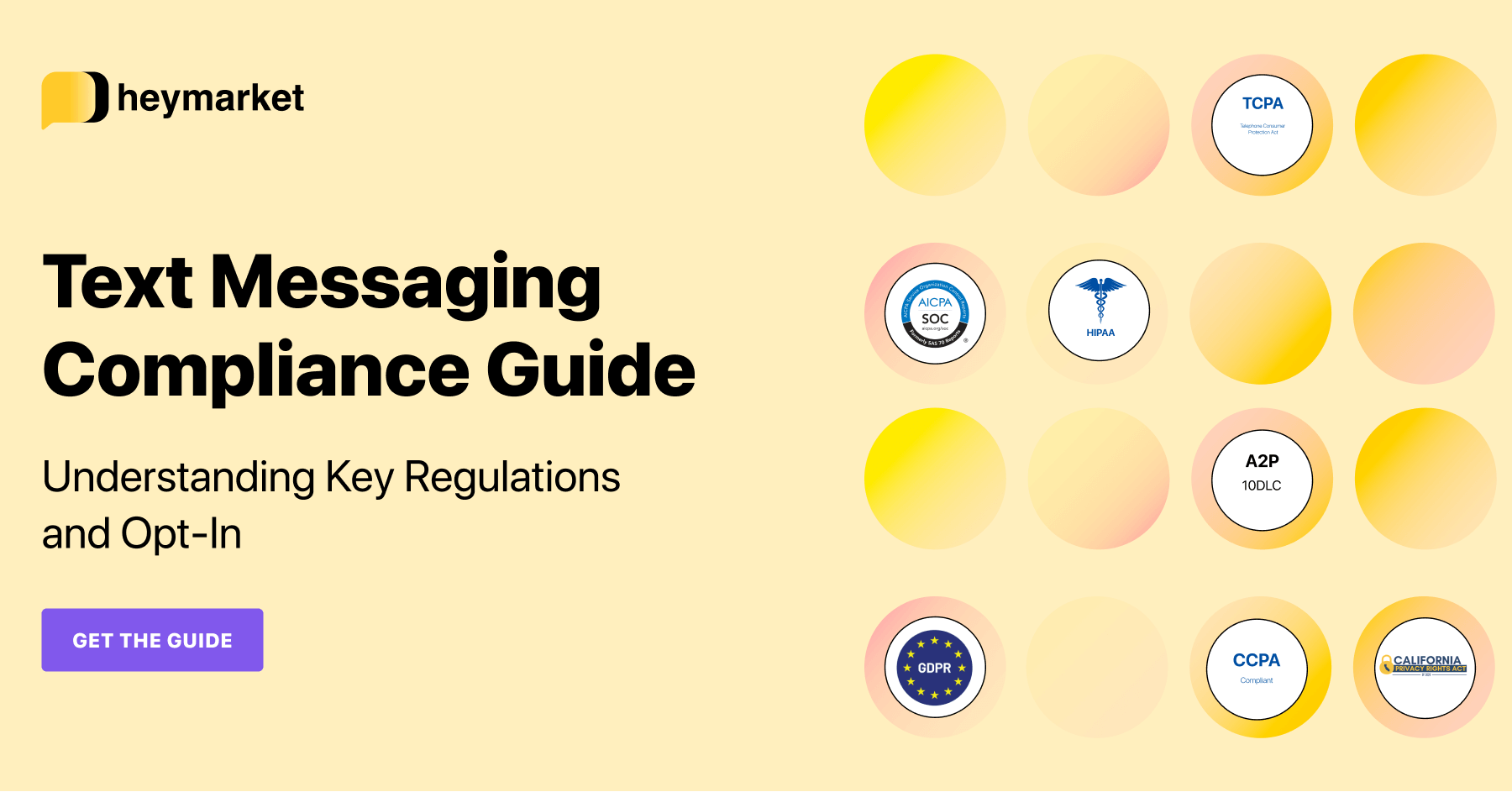
More and more healthcare organizations adopt texting for convenient patient communications. In fact, you’ve probably seen business SMS platforms promote features that support HIPAA-compliant texting. But what does HIPAA text message compliance mean if your brand isn’t in the healthcare industry? Let’s dive in.
Is SMS Texting HIPAA Compliant?
The texts you send from a business SMS platform aren’t automatically HIPAA compliant. This is the case even if you use a secure text messaging platform with strong SMS security features, like in-transit and in-storage encryption. These features only help support HIPAA-compliant texting. You and your team have to take specific actions to achieve HIPAA text message compliance.
Which Businesses Are Subject to HIPAA Text Message Compliance?
Businesses that handle patient data or work with patients have to adhere to HIPAA. If they use business text messaging, they must achieve HIPAA text messaging compliance. But even if your brand isn’t a healthcare organization, you should strive for HIPAA-compliant texting with customers anyway.
Learn more about HIPAA and compliance with key text messaging regulations in our guide.
Why Should You Aim for HIPAA-Compliant Texting?
HIPAA’s main goal is to protect patient data. Similarly, protecting customer data is likely one of your top goals. Plus, customers are becoming more privacy-minded—and they’re starting to notice which brands care about keeping their customers’ data safe. By implementing HIPAA-compliant texting, you can better protect customer data, earn customers’ trust, and keep long-term customer relationships going strong in the long run.
Achieving Compliance
Achieving compliance is an involved endeavor. HIPAA compliance requirements span both how you send messages and how you store and protect electronic protected health information (ePHI). To truly achieve compliance, your team has to review and adjust your internal messaging and data processes.
What HIPAA-Compliant Texting Looks Like
Once you achieve HIPAA compliance, your texting practices will be a lot more secure than before. You’ll be able to better secure and build customer trust. For example, your team will be:
Using a HIPAA-Compliant Business Text Messaging Platform
First and foremost, you’ll choose and use a secure business text messaging platform, if you haven’t got one already. It will encrypt texts in storage and in transit, so customer texts can’t be intercepted as they travel through your business SMS platform. You’ll also approve company-issued and personal devices used to access ePHI data, and overwrite or destroy physical devices containing ePHI data before recycling them. A secure platform will be the foundation of your newly compliant texting.
Asking for Customers’ Written Consent
You’ll ask customers to give their written consent before you text them. They can give their consent by texting your number a specific keyword or checking a box on a web form. You’ll also let them know what types of content you plan on sending them. These measures will let customers know that you prioritize their privacy right up front.
Refraining from Sending Sensitive Information
With help from a secure business SMS platform, texts are safe in transit and in storage. But once they’re on a contact’s phone, someone can just pick up that phone and scroll through old messages, and it’s possible for bad actors to intercept messages coming from a consumer’s phone. When you achieve HIPAA-compliant texting, you’ll refrain from texting customers sensitive information or asking them to share it. In the medical field, sensitive information includes test results, diagnoses, treatment plans, and more. In other industries, it might include credit card numbers, financial reports, case files, or insurance forms. You’ll text customers links to your secure portal if you have to share sensitive information.
Focusing on Administrative Information Only
When you’re HIPAA-compliant, you’ll use business SMS for administrative tasks only. That way, you can avoid sending sensitive information altogether. You’ll text customers with appointment reminders, scheduling requests, bill alerts, delivery updates, feedback requests, or portal notifications. This is an easy way to avoid sending sensitive information, one of the key tenets of HIPAA-compliant texting.
Making It Easy for Customers to Opt Out
With HIPAA-compliant texting, it will be just as easy for customers to opt out as it was for them to opt in—if not easier. You’ll allow them to opt out by texting a simple keyword, like STOP or NO. Your secure text messaging platform will automatically unsubscribe contacts who text in with those keywords. You’ll include opt-out instructions on each initial text to customers, who will appreciate knowing they can unsubscribe at any time.
The Bottom Line: HIPAA-Compliant Texting
Achieving HIPAA text message compliance improves your SMS security strategy and helps you more effectively keep customer data safe. In sum, it’s a powerful standard to achieve—and a great way to build trust with your customers.






